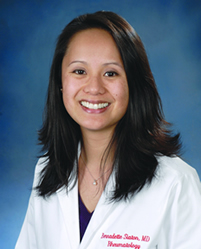A Tuesday Rheumatology Research Foundation-sponsored clinical symposium will help rheumatologists expand their knowledge of educational methods and curricula.

The Foundation clinical symposium, titled Innovative Educators, Novel Techniques: A Rheumatology Research Foundation Special Session, takes place from 1:00 to 2:00 pm Tuesday in room 150A. The session will include presentations by Rheumatology Research Foundation Clinician Scholar Educator Award winners, including Bernadette Siaton, MD, who will present “Development of a Web-based Rheumatology Curriculum.”
Rheumatology educators — especially rheumatology training program directors — should gain insights into novel approaches to teaching and curriculum development for medical students and residents working in musculoskeletal and rheumatic diseases. The session will also explore the important role of clinician scholar educators in medical education and training.
Dr. Siaton, Assistant Professor at the University of Maryland, Baltimore, said she believes it is important to showcase the scholarly work of rheumatology clinical educators, and is pleased to be part of the symposium.
“Education has always been a priority for the American College of Rheumatology and the Rheumatology Research Foundation,” she said. “The Clinician Scholar Educator Award and this special session demonstrate the Foundation’s commitment to supporting rheumatology educators and their educational endeavors.”
Dr. Siaton will discuss the results of her project, which focused on improving rheumatology education for residents, particularly in programs where the majority of residents have little exposure to rheumatology. She will review practical strategies educators can use, including web-based learning, which she said was helpful for trainees with varied and busy training schedules.
The session also covers the use of script concordance testing, which assesses clinical decision-making. She will then review the latest data regarding the efficacy of such strategies.
“I will discuss the efficacy of web-based rheumatology modules in a population of internal medicine residents at a single institution during a three-year period,” Dr. Siaton said. “The research included the creation and validation of an assessment tool for the knowledge areas of gout and osteoarthritis and use of the tool to assess resident learning and clinical decision making.”
Dr. Siaton said she wants attendees after hearing the practical applications of web-based learning and the data to support it to come away with an understanding of how the widespread accessibility of web-based modules makes them an efficient way to educate residents.
At the University of Maryland, where she has been a member of the faculty since 2011, Dr. Siaton serves as Associate Program Director of the rheumatology fellowship and Co-Director of the Introduction to Clinical Medicine II course for second-year medical students. She was a 2014 recipient of the Rheumatology Research Foundation Clinician Scholar Educator Award and a member of the Clinician Scholar Educator Advisory Panel. She is pursuing her master’s of education in the health professions degree at Johns Hopkins University, Baltimore, MD.
Jessica Berman, MD, Associate Director of the Rheumatology Fellowship Program and a leader of rheumatology resident education for the Internal Medicine Residency Program at Weill Cornell Medical College of New York Presbyterian Hospital, will present “The Rheumatology Research Foundation Clinician Scholar Educator Award: Fifteen Years Promoting Rheumatology Educators and Education.”
Kenneth S. O’Rourke, MD, a clinician educator faculty member in the Section on Rheumatology and Immunology at the Wake Forest School of Medicine, will present on “Clinician Educator Resources – ACR Website.”
CLINICAL PRACTICE TRACK
Innovative Educators, Novel Techniques: A Rheumatology Research Foundation Special Session
1:00 – 2:00 pm Tuesday • Room 150A


